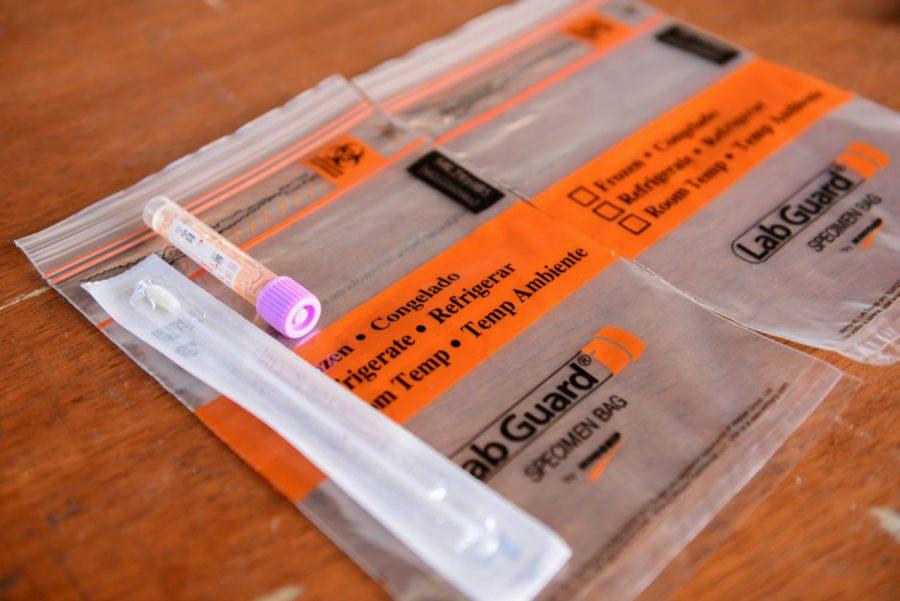Pitt adds 54 COVID-19 cases since Tuesday
April 2, 2021
Pitt added 54 new COVID-19 cases, composed of 51 students and three employees, between Tuesday and Thursday, with 92 students currently in isolation. The University’s previous case report, covering last Friday to Monday, included 30 cases.
This is the first case report since Pitt moved back to the middle Elevated Risk posture and enacted a shelter-in-place on Wednesday. These stricter measures followed a “consistent increase” in positive cases among students and the U.K. variant, B.1.1.7, being detected on campus. Pitt’s COVID-19 Medical Response Office reported Tuesday that 13 residence halls had reported cases of COVID-19.
The CMRO said in a Friday evening email that the five-day moving average of positive cases per day went from 8.6 to 13, and it “[continues] to be concerned about this level of spread.” The CMRO also said this weekend and next week are “critical junctures” in stopping the spread of COVID-19. Kenyon Bonner, the vice provost and dean of students, previously said he is worried about the impact of the state’s loosened restrictions on bar and restaurant capacity, which begin Sunday.
“By adhering to the mitigation measures and shelter-in-place protocols, you lower your own risk, support the health and safety of our community and help us avoid needing to go to the High Risk Posture,” the email said.
The shelter-in-place order will remain in effect until the CMRO announces that it has been lifted. During this period, the CMRO said students should only leave their rooms to “attend classes, labs or clinicals in person; pick up food; exercise safely; study in the library; work when necessary and shop for essentials and medical needs.”
Pitt’s Student Health Service is open Saturdays for testing from 10 a.m. to 3 p.m., the CMRO added. Students should call 412-383-1800 to schedule an appointment if they have symptoms of COVID-19.
The Allegheny County Health Department and state health officials have continued to report high case numbers. According to hospital data compiled by The New York Times, about 82% of ICU beds in the Pittsburgh area are currently occupied, compared with 78% statewide and 70% nationally. UPMC Shadyside is at 91% capacity and has 17 ICU beds remaining.
The University has had 1,218 students and 228 employees test positive since June 26, with 1,126 students and 217 employees recovered thus far.
The CMRO also said Pitt will continue to apply for vaccines from the state and “keep our community updated.” It also said people who received their first vaccine dose at the Petersen Events Center will be contacted when it’s time to schedule a second dose. Pitt has given more than 10,000 vaccines and hosted 13 clinics in coordination with the Allegheny County Health Department.
There are 92 students currently isolated at home or in Pitt’s isolation housing, which is reserved for those who have either a confirmed or suspected COVID-19 infection. Pitt has about 300 isolation beds.
The University is planning for on-campus, in-person instruction for the majority of classes as well as “the full range” of on-campus living and activities for the fall semester. Chancellor Patrick Gallagher said that these plans are dependent on continued availability of the vaccine across the country, and that Pitt is not anticipating a requirement that the incoming class have the COVID-19 vaccine.
Pitt implemented a systematic, random testing strategy, which involves testing several hundred students each week on Mondays and Wednesdays inside Posvar Hall. Out of 256 students without COVID-19 symptoms randomly tested on Monday, six were positive, which increased Pitt’s spring prevalence rate from 0.63% to 0.72%. The Monday testing session was the first listed on the University’s data dashboard in nearly two weeks.
The University also implemented a variety of new policies due to the pandemic during the spring semester, though some community members questioned whether the safeguards are sufficient. Students moved into dorms in four cohorts, beginning in late January and continuing into early February. Students needed a negative COVID-19 test before moving back on campus. Faculty and staff also have access to mail-in tests if they meet certain criteria.
Additionally, students are encouraged to shelter in place at least seven days before moving in. Once on campus, students are required to shelter in place again for at least 10 days or until the CMRO announces that it’s safe to move about campus. Students may attend classes during this time. Pitt also planned testing of students to monitor the virus’ spread, required students, faculty and staff to complete COVID-19 training and imposed strict penalties for violations of health guidelines.
Bonner said student organizations who host a party or event can face suspension, and students hosting large parties can be suspended. Students living on campus who attend large parties can have their housing suspended for the semester, and students living off campus can be switched to persona non grata status, preventing them from entering University buildings or property.








